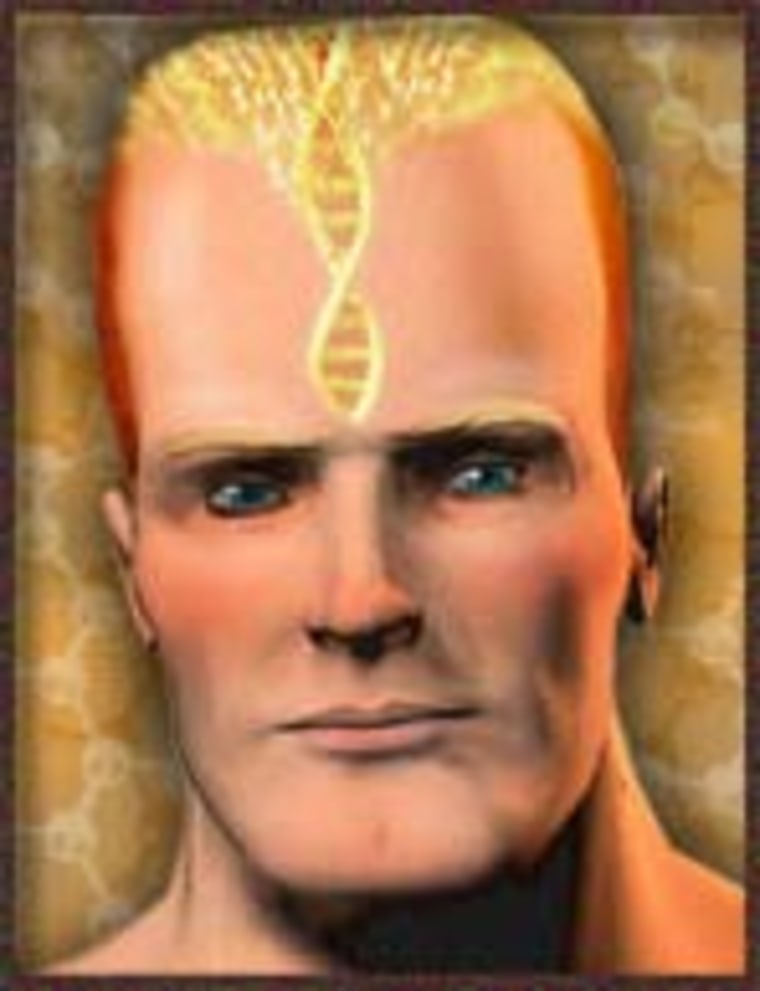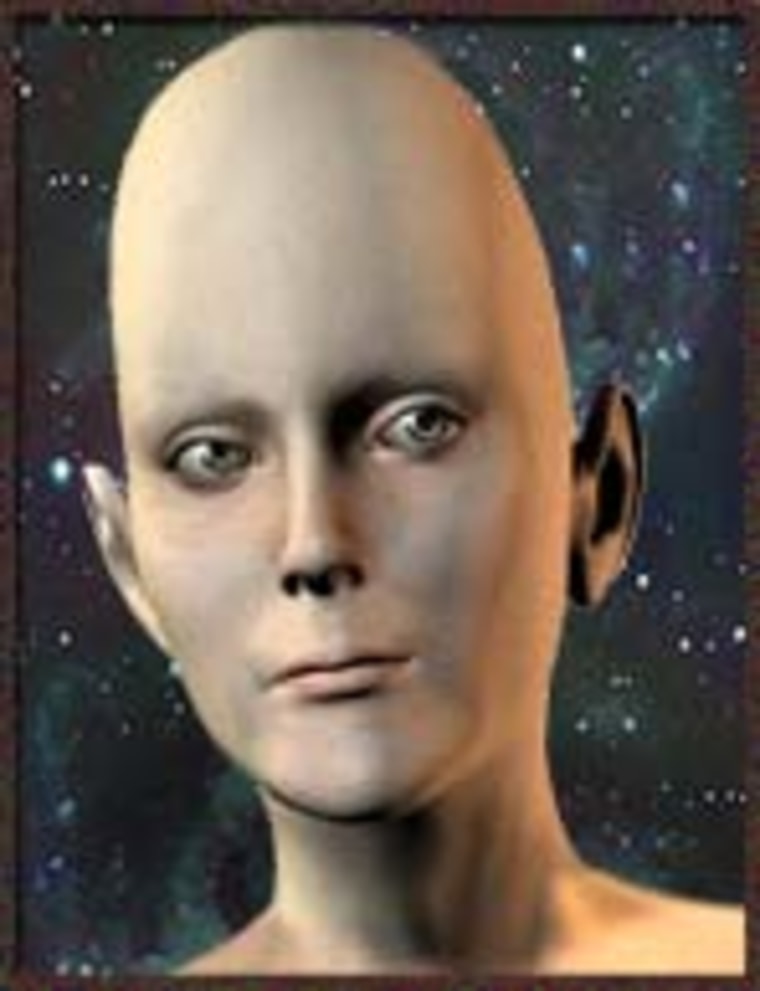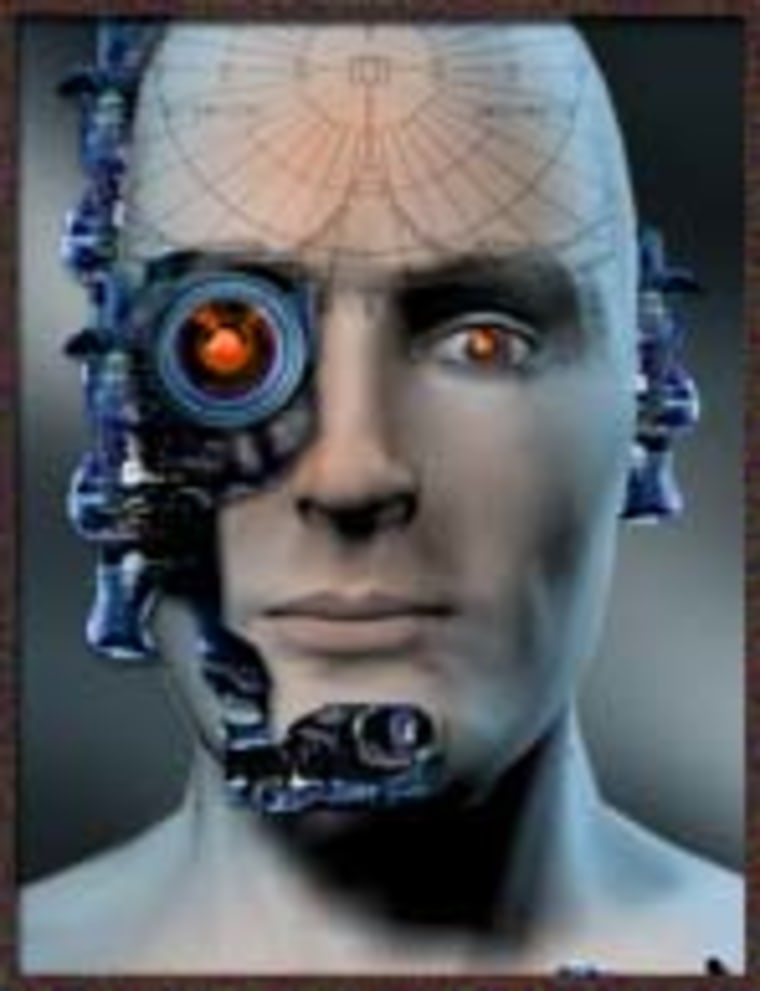Are humans destined to morph into a genetically and cybernetically modified master race? Have we been able to suspend the rules of natural selection, or will our wasteful ways catch up with us big time? Are we doomed to failure, or are we destined to muddle through pretty much as humans always have?
Over the past month, we've received about 600 e-mails musing on such questions, in response to our "Fast Forward" report on speculative scenarios for future human evolution.
Some were tickled to hear how experts rated the prospects for Unihumans (globally blended culture), Survivalistians (adapted for the post-apocalypse), Cyborgs (machine-human hybrids), Numans (genetically modified elite) and Astrans (optimized for interstellar colonization). The report was even adapted for newspaper publication in The Australian.
Others thought the whole exercise was just silly.
"People will evolve to the point where they no longer write crap like this article," wrote Bob Meyer of Kirkland, Wash.
For the record, when we asked MSNBC.com users to rate the likelihood of the various survival scenarios, the top vote-getter in our unscientific survey was "none of the above," with Unihumans as a close second.
The scenarios were drawn up under the assumption that the human species would not go extinct, but would be subject to evolutionary pressures that would change its character over the course of millions of years. A good number of readers took issue with those assumptions: Some said they were sure humanity's days were numbered. Others said the rules of natural selection would be suspended as long as humans were the planet's dominant species. Still others relied on religious texts to contend that evolution itself was a scientific fiction.
Then there were writers who put forth their own scenarios for future evolution. For example, why bother keeping the Astrans in suspended animation? A robot-controlled ship could simply carry stores of sperm and eggs to an outlying planet for "seeding" when the time was right.
Some of the e-mails were deadly serious. Others were downright funny, and that kind of good humor is just what's needed when you're discussing a subject that contains at least as much science fiction as science fact. Speaking of that, several readers recommended science-fiction novels or speculative books that go into far more depth on the subject of future evolution.
You'll find reading recommendations and snarky comments as well as serious reflection in the following selection of e-mails:
Jim from Montana:
One factor not mentioned in your scenarios is that of sending sperm and eggs on "slow boats" into space. [The sperm and eggs] would be combined by selectively intelligent robotics at a long distant future time. The humans would be educated, again by selectively intelligent "teachers," and then they would take over for themselves. In such a program, more than likely only the most highly developed (of current times) would be selected for contributions, and therefore a natural "super" race be the result. Keep in mind that after the great many years of travel needed have passed, base humanity may well have surpassed that technique and have futuristic humans waiting to greet those arriving on the slow boat.
Jon from Shanghai:
I think, as more technology develops, we will just evolve into "Lumps." A "Lump" is just a large set of buttocks with two eyes and four stubby appendages. This comes from sitting behind desks, lounging in front of the TV, or surfing the Net and not really needing to go out and do much of anything.
Gina Burdge, Temecula, Calif.:

This all sounds so ridiculous. Are we trying to scare people with scientific advancement? Robin Cook's idea of putting people in comas for organ farms never happened because of organ transplants. In-vitro fertilization was supposed to create labs where babies were being grown in jars. By the year 2000 we were all supposed to be living like the Jetsons, but we're scaring people into believing we're going back to the Flintstones.
Stem cell research may revolutionize medicine just like penicillin or organ transplantation, but it is being demonized by those who do not understand science. Each scientific advancement has improved life as we know it, and I believe future ones will continue to do so. However, I do believe we have the capacity to destroy our environment if we ignore the scientific principles we know exist and do not heed them.
Jake in Berkeley, Calif.:
I am extremely disappointed with your attempts at an intelligent article. It is obvious that very little, if any, attempt was made to reconcile these far-reaching statements with simple Mendelian ratios. A little math of the multiplication variety would immediately show you that a larger interbreeding pool does not lower variety: Your concerns about losing racial variety are completely unfounded. I don't have a problem with you printing complete science fiction, but if you want to try to sell it to the reality-based community known as science, I suggest you at least consult a population geneticist first.
Mike Thurman, Flagstaff, Ariz.:
Human history will span less time than that of the dinosaurs. We will continue to lengthen our life span and save human lives that in days past would have been lost; human overpopulation will continue at a devastating pace. We will stretch well beyond the capabilities of Planet Earth to sustain us. The only question that remains is: when we finally destroy ourselves, how much of the planet will we take with us?
Gary Propheter, Medford, Ore.:
Unfortunately, I see humankind evolving into the domesticated version. One of the key aspects of civilization has been the declining emphasis on individual ability (intelligence/skill) and the increasing impact of genetic resistance to disease. Modern medicine and genetic engineering will only strengthen this trend as religious traditionalists will prevent measurable diversion from "God's creation." In time ... a new disease will rip out the heart of societies worldwide (remember the black plague?) and all that will be left are some lemmings who don't understand their tools well enough to continue to survive.
Bryan Roth, Hillsboro, Ore.:
I don't really find any of those scenarios possible. Instead, I have found that the only sensible possibility is that there is a God. Yeah, I know that the word God makes some shiver with fear, but evolution just doesn't add up. How could something come from nothing? And if the Big Bang is real, and where did all the energy and matter that made the Bang happen come from? Either way you look at it, you can't say we're alone. There has to be a God — nothing else could have made this marvelous universe.
David Larson, Texas:
I believe in Jesus Christ as my Lord and Savior, and I also fervently believe in evolution. I wish people would acknowledge that evolution could be (and is, in my opinion) yet another part of God's infinitely complex designs.
Randy Daughenbaugh, Rapid City, S.D.:
Once a species controls its environment, evolution stops. Humans are there now, with the possible exception of viruses and bacteria. But we may control them soon too. I don't believe that there will be more evolution until other planets are settled.
Jane, Durham, N.C.:

I think the "Unihuman" is far too light to represent a blend of all races on earth. In the global context, fair skin is in the minority. In India and the Middle East, there are people with skins as dark as what people think of as African.
William F. Whisenant, Austin, Texas:
No one has mentioned the way that domesticated animals are manipulated or improved: by selective breeding. Of course, this is such a politically volatile topic that it will seldom be discussed openly, let alone tried. We know many attributes including intelligence have a large genetic component. If one were to truly improve the human species, one would promote the interbreeding of those individuals that represent the best of the characteristics we wish to enhance. Likewise, we would prevent or at least limit the breeding of those from the shallow end of the gene pool.
George Widener, Asheville, N.C.:
The dramatic rise in cases of autism and the research it has spawned may shed light upon our future evolution. The human brain is possibly evolving into a new form which will be truly amazing by today's standards. It is known through studies of savants that the human brain is capable of computerlike computation and memory feats. Yet the vast majority of savants are cognitively disabled. New modern studies of savants indicate that all humans have dormant subconscious savant activity going on. In the future, we will all be Kim Peeks, megasavants but without the disability. There will be a huge quantum leap in our intelligence and memory capabilities.
Walter Mitchell, Albuquerque, N.M.:
Five options:
- Humans grow to resemble bad computer graphics, evolve oversimplified adaptations to complex stimuli
- Overpopulation and obesity cause humanity to become one single world-covering blob.
- Autism becomes an advantageous mutation, humanity separates into idiot-savant ruling class vs. retarded rabble.
- As yin becomes yang, as night becomes day, evolution, having long ago reached the peak of its cycle, reversed and we are currently devolving.
- By the year 2525, everyone pretty much resembles Michael Jackson in appearance and behavior. One world, one race, one sex.
Dennis, Middletown, Conn.:
I think it is a far more realistic reality that we destroy ourselves. As Einstein said, "I don't know which weapons we will fight World War III with, but I know World War IV will be fought with sticks and stones."
Shirley, Grain Valley, Mo.:
Well, this isn't my own idea, but I like it. It's based on a book I just re-read — "Darwin's Radio," by Greg Bear. In this book, big jumps are made in our evolution in one generation. The change is motivated by our own genes in response to our environment (That's one theory in the book.) ...
Richard Sempsrott, Boise, Idaho:
Although his work has been set aside for many of years as being outside the box, the theories of the late Timothy Leary in "Musings on Human Metamorphosis" and "Chaos and Cyber Culture" address this issue with clarity and evidence worth opening your mind to. These theories from the late '80s and early '90s present themselves with compelling implications of today's world. Leary proposes that space migration is an inevitable evolutionary destiny, and that we possess circuits of neurons meant to be activated for high altitude and cybernetic ecological niches. In the near future, with the new spike of space fever called the space race, and Virgin Galactic and Bigelow Aerospace, etc., fully dedicated to creating cheap orbital real estate, the first zero-G birth doesn't seem so far off. Leary also argues that the genetic process has designed us to manipulate it for three reasons indicated in his saying "SMILE" — space migration, intelligence increase, and life extension. ...
Marcus Schaefer, New Haven, Conn.:
It's my opinion that no one of the scenarios will occur, but rather a combination. The best example of my view of the path that future human evolution is likely to take is Bruce Sterling's book "Schismatrix," where the engineered evolutionary paths of population groups diverge and converge due to social and philosophical pressures/identities. Basically, evolutionary variation will be driven by social/cultural isolation and/or divergence, not geographical isolation.
Robert Norsworthy, Houston:
I would have liked to see you incorporate [Ray] Kurzweil's notions about the Singularity, some of which you hinted at ... although you had a lot of ground to cover, and did so well I thought. I think Kurzweil would argue that humans will want to augment themselves with machines and will do so at every opportunity, using both machine and genetic augmentation, until such time as there is a new "hardware" platform that doesn't fail, i.e., doesn't die. At that point, there may be some humans that "stay behind" — like the Amish — but the vast majority will move ahead, ultimately becoming some as yet unpredicted (to my knowledge) combination of genetic machine. Kurzweil's view is that we will become a machine in an evolutionary way such that we will not view the machines as "other." It will be ourselves. We will not give birth to a race of machines and just watch and hope, that's just naive.
Pivorak:
The Ringworld series by Larry Niven investigates the divergence of a proto-human spacefaring race. On the Ringworld, "breeders" evolve to fill many ecological niches.
Michael O'Hara, Redmond, Wash.:
What may happen is that as humans spread to other worlds, human subspecies for each world will develop. This will occur both through evolution and a bit of genetic engineering. For instance, Martians will have lightweight frames and powerful lungs, to adapt to lower gravity and weaker atmospheres. E.E. "Doc" Smith's Lensman books touched on this idea. The humans that settled on the world of Valeria — which has triple Earth's gravity — became incredibly muscular. When advances in body armor made projectile weapons less effective, axes were reintroduced into warfare. Valerian space-axemen were the most feared soldiers in the galaxy. Terraforming might weaken many of these changes, but each world will have different levels of gravity.
Yonah Berwaldt, Palo Alto, Calif.:
The previously outlined scenarios of the future make the same mistake: they presuppose a linear (or mild exponential) growth of intelligent technology. None of them outline the simple observation that intelligent machines can create still more intelligent machines ad infinitum. Vernor Vinge's conception of the technological singularity seems more plausible than any scenario advanced in the aforementioned discussion.
Let us note that humans are not just genius chimpanzees that created agriculture and industry to grow bananas. The difference between a human and a post-human, or a true general all-purpose artificial intelligence, will be of at least this magnitude. A chimpanzee attempting to fathom a human is like a human attempting to understand a post-human or a truly self-recursive AI. ...
Vinge's seminal analysis helps assign validity to various futurist scenarios. Unsurprisingly, the Technological Singularity as envisioned by Vernor Vinge and other futurist thinkers, such as Max More, Nick Bostrom, and Eliezer Yudkowsky, garners more support than the standard futurist model. I recommend consulting their treatises and their Web sites for more information.
Geeta in India:
With the kind of diseases that are popping up, and with the earth becoming poisoned and depleted of essentials for human survival, I do not think the species will last a whole lot of years to expect to see the effects of genetic blending that is taking place. Because of the very unnatural mode of living today, evolution will not result in the survival of the fittest gene, and therefore the slightest unexpected natural calamity could destroy the human race. There will certainly be a new species that would evolve, which is likely to inhabit the waters or maybe below the earth's crust for survival.
Danila Medvedev, Russia:
"Which of the scenarios for the future of humans sounds most likely to you?" Why can't you say it? The false journalistic objectivity? The fear of bias? My rough estimates:
- Unihumans — 0%. Assuming we have a global peaceful society, radical technological progress is inevitable.
- Survivalistians — 3%. Even in the unlikely case we wipe the humanity out, it will not take long enough to rebuild it. And it is rather unlikely (though possible) that we can destroy the civilization completely without destroying the species.
- Numans — 20%.
- Cyborgs — 30%.
- Astrans — 0%. If we have advanced space travel, it is inconceivable that natural evolution is still allowed to continues.
The missing road is, of course, the posthuman, radically different forms, including, for example, uploading, merging of humans into hive minds, etc. The article is nice, but fundamentally flawed, because it treats all speculation as equally valid, which is obviously wrong. Scenarios 1, 2 and 5 are useless, except that the make some semi-valid comments (like "the future will be global," "we will travel to stars," etc.).
Lafayette Eaton, Santiago, Chile:
... The human species is doing everything it can to prevent natural selection from acting on us. Modern medicine allows many people to survive and reproduce who could not have done so only a few centuries ago. Some of our greatest efforts are directed at helping persons to survive and reproduce, who could not have done so "on their own." ...

If the human species is to evolve, it will be because some selective force appears which kills many of us before we can reproduce, while others survive and procreate because their genes allow them to resist this "selective force." Or, and I tremble at the idea, because there is a global decision to let only certain types of people reproduce, those who have genetic constitutions that we deem "desirable."
There are a few selective forces around which may make humans evolve. AIDS is one, and perhaps some of the contaminants we are releasing into our environment. However, the "evolution" they may produce is very specific. It would involve resistance to AIDS, the contaminant, or whatever force is killing very large numbers of people.
Evolution is not "going" anywhere, it is simply a hereditary response to selective forces. Unless these forces exist, by design or by accident, we should not expect humans to evolve in any important way. And we can't even predict what this evolution will be, unless we know what the "force" is, and which genetic constitutions allow individuals to survive it.
Mehul Gohil, Nairobi, Kenya:
I am a chessplayer and disagree with this article on one point. It is stated that Garry Kasparov's loss to the machine Deep Blue is a "vivid example" of machines dominating us in some intellectual spheres. This can only be said by someone who has limited understanding of chess.
If the games in that famous match are analyzed with a modicum of understanding (simply that of a competent amateur) it becomes apparent that Deep Blue didn't play that well. True, it did win the match, but that was because of Kasparov making an elementary blunder in the crucial game — an error a club player would have recognized. In fact, the remarkable thing was that Deep Blue was unable to beat Kasparov in the three games where Kasparov employed amateurish opening ideas not seen at the grandmaster level.
Current computer programs such as Fritz are much stronger than Deep Blue, and they run on your ordinary desktop.
It is one thing to believe media hype, and another to see the facts for yourself.
Pirshing Gudmundsson, Reykjavik, Iceland:

My own idea is: Programmed robots can be sent with all necessary packed equipment, chemicals and materials in spaceships to the desired planet to inhabit, to install stations for assembling humans (Astrans) or whatever and everything else that follows, then beam humans(Astrans) from earth stations to that planet, which will be assembled and put together by the programmed robots. In this case, the programmed robots will be in charge until the human(Astrans) arrive. Then both the robots and humans (Astrans) should be working together to do the rest of the work.
Camillus Fernando, Sri Jayewardenepura, Sri Lanka:
We will develop along the lines that God would want us to develop.
Kalyan in Kuwait:
Our children are our future. So how you want them to become depends entirely on the social etiquette of the day. If designer babies become the trend, will we be following the footsteps of the megalomaniac Hitler? Luckily, he was not a visionary but a mad land-grabber who lost out to those whose lands he wanted to usurp.
... Our evolution depends directly on our IQ. So, teachers, governments, cults and societies, beware what you fill the minds of impressionable youths with. Give them knowledge, and let them decide what is good for themselves....
Koowan P. Stark, San Mateo, Calif.:
I think humans will all evolve a special waffle-baking appendage. We will squeeze genetically modified squirrels like oranges in order to produce enough syrup.
Ken Hart, Arvada, Colo.:
I for one vote for the human race evolving into a race of eyeless mole-men and doing the bidding of an evil rat overlord and his minions. I suppose it would be farfetched to assume that they would offer a good dental plan. I plan to help this genetic mutation along by offering seminars on how to burrow blindfolded.
Dave J., Phoenixville, Pa.:
As interfaces between computers and humans become more sophisticated and efficient, and simulations become more effective, I think it likely society will move towards a voluntary "Matrix"-like environment. Why bother with additional biology or bionics when you can fool your senses into believing you've done it already, and you have the advantage of being able to try out a new scenario on yourself every week? With a global neural-simulation network, we could have every one of the possibilities you list above (including the Second Coming, for those who subscribe to GodNet), and an infinite number of others, simultaneously. In fact, assuming that the individual has near-complete control of the environment (at least in their own private worlds), I suspect it would meet most people's definitions of paradise/heaven.
Lester Rose, Wichita, Kans.:
I have been a high-school science teacher for many years. Observing social stratification in high schools and the "reverse bell curve" evident in grades, it would appear humans are selectively breeding offspring who are either motivated and highly intelligent or lethargic and much lower in mental abilities. This tendency to marry individuals much like ourselves would, in the long range, head the human species toward the existence of two subspecies which are separated not by physical barriers, but by self-established social barriers.
Chris R.:

During the research currently under way on disease-resistant genes, higher IQs and stronger physiques, humans will adopt machine parts to aid in survival. The problem with humans is, we never leave well enough alone. These machine parts will become prototypes for the geneticists to manipulate our genome to replicate the machines' functions with our natural bodies. This will, for a short span, give rise to a caste system, and I use the term "caste system" loosely. With the new knowledge of replicating machine function with our genetics, humans will be able to manipulate genes at will. Radiation-resistant on Monday. Water breather on Wednesday. Super jock for the weekend games by Friday.
Jerry Ricks, Seattle:
Actually there was a study done in which mice were genetically engineered to have an extra gene for the NMDA receptor. These mice, dubbed "Doogie" mice, after the TV series' precocious child doctor, were smarter than normal mice, had better problem-solving skills and memories. How long will it be before some millionaire tries it on his own children produced by in-vitro fertilization?
Larry Griggers, Locust Grove, Ga.:
I submit for consideration that we may be looking in the wrong direction to determine how we originated as a species. Instead of looking backward and studying fossils, we should look forward with computer models and see how long it would take for our science to evolve sufficiently for us to "write a DNA" of our own. DNA is, after all, just a miniature computer program using four-bit words. Consider how our programming and miniaturization skills have evolved in the last 30 years. Now project that rate of discovery ahead another 30 years ... 100 years ... 1 million years! Is it inconceivable that we will know how to write self-sustaining programs like DNA? Now how much of a leap is it to say that we were programmed or created in just this manner?
Evolution is just too slow a process to explain today's diversity of life forms. How many accidental evolutions does it take to create rods and cones in an eye? But what if we suppose an alien species evolved over trillions of years into a higher life form, sat down and created DNA as a homework assignment and then sent the resultant DNA floating through the universe waiting for it to find a supportive environment?
Wonder if the teacher gave them an "A" on the project?
